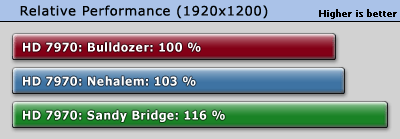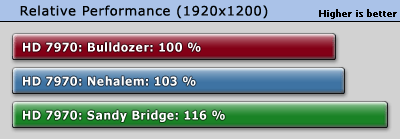Yeah, i'm not sure TPU's scaling model there is entirely useful. it shows a 2500k at low res as better yet once the res goes up to what is more normal res the FX keeps its performance and starts to close the gap.
Look at this one, http://www.techpowerup.com/reviews/AMD/HD_7970_CPU_Scaling/9.html
The FX is around 120 FPS at every res and stays around there right up to 2560 x 1600 where the FX beats the 2500k.
The same sort of thing happens on every benchmark there.
The 2500K is faster at 1024 x 768 , once the res goes up that gap closes right up.
Look at this one, http://www.techpowerup.com/reviews/AMD/HD_7970_CPU_Scaling/9.html
The FX is around 120 FPS at every res and stays around there right up to 2560 x 1600 where the FX beats the 2500k.
The same sort of thing happens on every benchmark there.
The 2500K is faster at 1024 x 768 , once the res goes up that gap closes right up.

